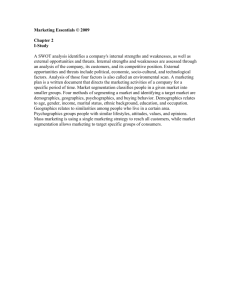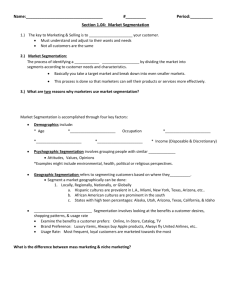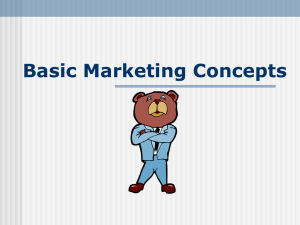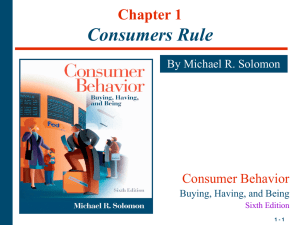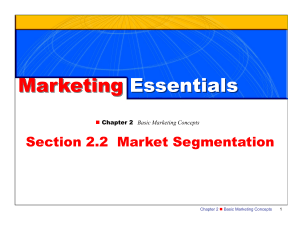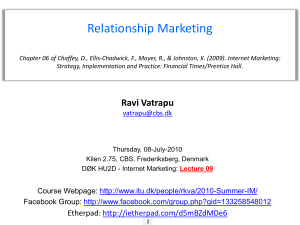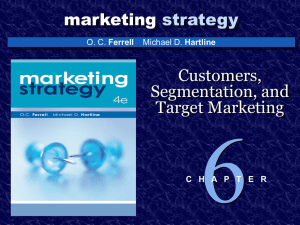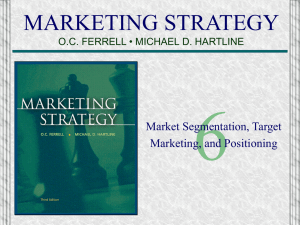market
advertisement
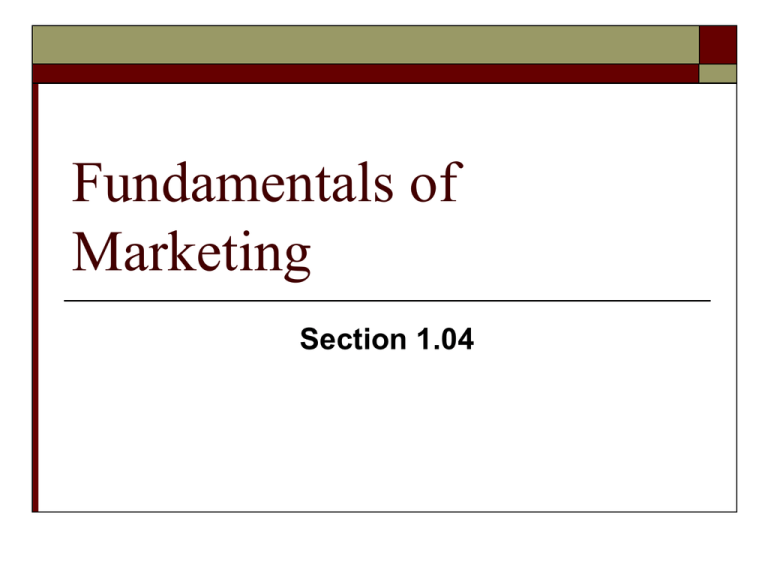
Fundamentals of Marketing Section 1.04 RELATIONSHIP OF GOALS, TACTICS, & STRATEGIES TO THE MARKETING MIX Mission Statement – the guiding principle for all business decisions and provides direction for planning. Goals/Objectives – established on a yearly basis and support the mission statement. Goals must be measurable and have a deadline. Strategies – are then developed to accomplish goals and it reflects the method to achieve the goal (what to do). Tactics – are then developed to accomplish the strategies; it is the how things will be done, daily actions. Marketing The Marketing Concept is the idea that a business should strive to satisfy customers’ needs and wants while generating a profit for the firm. Customer Satisfaction is very important. Repeat customers are what make businesses successful Customer Relationship Management If businesses don’t make money, they don’t do it! Fundamentals of Marketing Marketers realize that not every product can appeal to everyone. Marketers examine two key factors to define their market: Who is interested in a product? Who can afford their product? A market is made up of all people who share similar needs and wants and who have the ability to purchase your product. MUST MEET BOTH CRITERIA TO BE INCLUDED Examples of a Market Luxury Suites at Yankees Stadium Prices range from $600,000 and $850,000 Malt-O-Meal Frosted Flakes $1.41/box at DollarDays International Rich, Men, Sports Fans Lower Income, Kids/Single Parents Hollister Co. Santa Monica Jacket $140 jacket Teenage Girls, Colder climate areas, Medium-High Income Families Target Market & Market Segmentation Market Segmentation is the process of classifying customers by needs and wants. Goal is to identify the group of people who are most likely to become customers. This specific group is known as a Target Market All marketing strategies are directed towards the target market. Provides the focus of your marketing campaign. Marketer’s must develop a clear target market before developing a marketing strategy. Consumer v. Customer A product may have more than one target market. Example: Low Sugar Fruity Pebbles Identify the consumer: Children Identify the customer: Parents *Most five year olds do not purchase their Fruity Pebbles Same Product--- Different Approach To target parents you would use commercials that advertise how healthy they are and air them on a Saturday night. To target children you would use commercials that focus on how fun the cereal is, the bright colors, the cool characters and air this commercial on Saturday mornings. Target Market To develop a clear picture of their target market, businesses create customer profile lists of information about the target market. Age Income Level Ethnic Background Occupation Attitudes Lifestyle Geographic Residence Understanding these characteristics allows you to make better choices The Marketing Mix The Marketing Mix includes four basic marketing strategies called the four P’s: 4. Product Place Price Promotion 5. *People 1. 2. 3. These are the tools that marketers use to influence potential customers The 4 P’s…. Product: What you decide to make and sell. Includes the features, benefits, packaging, name, and brand. Place: Deals with how and where a product will be distributed. Price: Price is what is exchanged for the product. Reflects what a customer is willing and able to pay. Promotion: Refers to decisions about advertising, personal selling, sales promotion, and publicity. Pick a product MARKET SEGMENTATION Market Segmentation The key to marketing & selling is to know your customer You have to know what is cool, in order to continually reach your audience Not all customers are the same Use certain methods to reach certain customers Market Segmentation Market Segmentation is the process of identifying a target market by dividing the market into segments according to customer needs and characteristics. Basically you take a target market and break down into even smaller markets. This process is done so that marketers can sell their products or services more effectively. Market Segmentation Facts Why do marketer’s use market segmentation? Very costly to target all groups Must find the group of consumers who you have a clear competitive advantage Use research to determine if the costs of development are effective Specific information allows you to know your customers: Buying Behavior, Values, Fashion Interests, etc… Market Segmentation = Jeans Most people in America wear Jeans Not everyone wears the same type of jeans Market Segmentation: Price Market Segmentation There are four key factors that marketers use to determine how to segment a market: 1. Demographics 2. Geographic Variables 3. Psychographic Variables 4. Buying Behavior Demographics Demographics: Refers to statistics that describe a population in terms of personal characteristics. Age (Baby Boom, Generation X, Generation Y, Generation Z) Gender (Male v. Female) Occupation Education Income Disposable: Money left after taxes Discretionary: Money left after taxes & basic needs have been paid Marital Status Ethnic Background Psychographics Psychographics involves grouping people with similar lifestyles, as well as shared attitudes, values, & opinions. Examples: Latest Diet Trends Environmental Concerns Geographics Geographics: Refers to segmenting customers based on where they live. Segment a market geographically can be done: Locally, Regionally, Nationally, or Globally Hispanic cultures are prevalent in L.A., Miami, New York, Texas, Arizona, etc.. African American cultures are prominent in the south States with high teen percentages: Alaska, Utah, Arizona, Texas, California, & Idaho Market Segmentation Behavioral Buyers: Accounting for the type of shopping they prefer. Online, In-Store, Catalog Safety Issues concerning identity Mass Marketing v. Segmentation Mass Marketing: Occurs when a company uses a single marketing strategy to reach all customers Products has universal appeal and few features to differentiate them from competitors. Not as popular as it used to be because companies prefer to cluster consumers. Niche Marketing: Narrowing down your market and using precision to create your products Top Ten List Exchange list of wants and needs Based on your partners needs and wants you need to come up with a new product or service to meet one of their needs. You need to make decisions about the 4 P’s What is the product or service you want to create? What is the price you are going to sell it for? Where will you sell it? How will you promote it? Assignment List 10 needs and wants in your life at the bottom of your sheet Hello Kitty Track/Cross Country Ipod Stuffed Animal Car Smart Water Monster Energy Drinks Snuggie Blanket •Thermal Water Bottle •Keeps water at 10 degree $9.99 •Drops chewing gum out the bottom •Brail Censored buttons to guide all users •Walgreen's •Wal-Mart •CVS W •Commercial of athletes using my product G •Buy One, Get One Free •Breast Cancer Awareness Month promotion •Hello Kitty, Bye Bye Worries! Assignment Go around and take a picture(s) of the following: Geographics Does anyone have similar Target market of Ardrey Kell characteristics based on a geographical location Demographics Age Gender Ethnic Background Income Psychographics Activities Attitudes Play sports Clubs Workout Video games Personality & Values Class Clowns Religious Drama Dallas Cowboys Fans Students who have just moved here Certain Middle Schools Buying Behavior Brands Colors Fads Target Market Assignment Part II Upload pictures on Tuesday Label each picture based on what component of a target market you chose Determine the following for each group Characteristics that appeal to this group An item that they would purchase Promotional methods you would use to attract them Demographics: Age & Gender High School Students Female Some characteristics of a product that would appeal to this audience are….. An item that this demographic would purchase Promotional methods that we would use for this demographic are…. Psychographics Backpackers Buying Styles Customer looking for comfort Casual Products that might appeal Cinch Sack Bag Accessories like a rubber bracelet To promote we would go to lunches and give 5 free bracelets away to increase awareness Demographics Gender: Female What appeals to them Product that interests them How would you promote the Buying Behavior Characteristics that appeal to this group Converse Shoes An item that they would purchase GRHS Socks Flat billed hat Promotional methods you would use to attract them Buy One, Get One ½ Off Geographics Characteristics that appeal to this group An item that they would purchase Promotional methods you would use to attract them Psychographics: Sports Product: T-shirts geared towards each major sport. (football, softball, baseball, basketball) Competitive slogans against other schools. ---------------------------------------------Promotion: We will give people who are on the teams half price off their shirts so they can promote them, so it can get the word out.
